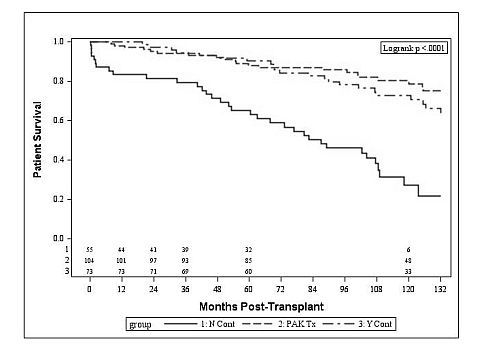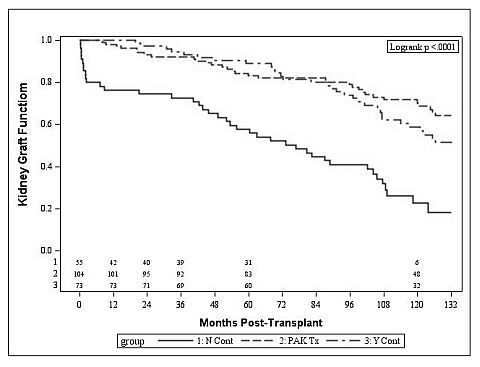Long-Term Impact of a Pancreas Graft on a Previously Transplanted Kidney
College of Public Health, University of Arizona, Tucson, AZ
Department of Surgery, University of Arizona, Tucson, AZ
Meeting: 2013 American Transplant Congress
Abstract number: 467
Introduction]: While pancreas after kidney (PAK) transplant allow for pre-emptive kidney transplant and reduced waiting times, there is concern that the additional ‘burden' of the pancreas transplant may have a negative impact. The aim of the study was to determine if long-term PAK was associated with a decline in renal graft function when compared with kidney transplants alone (KTA)
Methods: We categorized all 306 primary living donor (LD) KTAs in diabetic recipients performed at our institution between 1/1995 and 12/2003 into 3 groups: PAK Tx: 104 KTA patients with a pancreas transplant being performed between 2 months and one year after the kidney transplant. 71 patients received a pancreas outside this time frame and were therefore excluded. Y Control: 73 patients were eligible by American Diabetic Association criteria for a pancreas transplant but declined because of personal or financial reasons. N Control: 55 KTA recipients were too sick to receive an additional pancreas transplant. These patients were only included in the following analyses to show the complete outcomes of all KTA transplants. Primary endpoint was kidney graft failure or a > 25% increase in serum creatinine based on the 2 months post-kidney transplant baseline.
Kaplan-Meier survival analyses and Cox-regression models with time-dependent variables were used to describe graft function and patient survival and to define the potential risk of an additional PAK transplant.
Results: Figure 1 and Figure 2 show patient survival and kidney graft function for all 3 groups.


The positive effect of the pancreas can only be detected after at least 5 years of follow up. No negative impact of the PAK could be found.
Conclusion: a PAK after a successful kidney transplants offers an alternative to a simultaneous pancreas kidney transplant.
To cite this abstract in AMA style:
Gruessner A, Gruessner R. Long-Term Impact of a Pancreas Graft on a Previously Transplanted Kidney [abstract]. Am J Transplant. 2013; 13 (suppl 5). https://atcmeetingabstracts.com/abstract/long-term-impact-of-a-pancreas-graft-on-a-previously-transplanted-kidney/. Accessed March 3, 2026.« Back to 2013 American Transplant Congress
